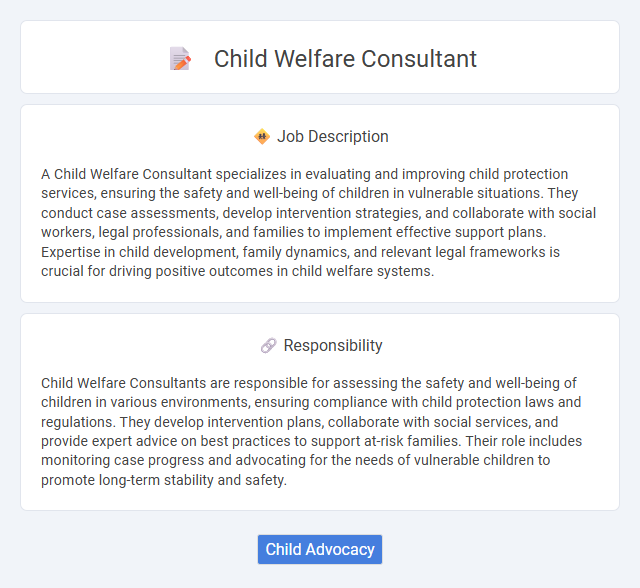
A Child Welfare Consultant specializes in evaluating and improving child protection services, ensuring the safety and well-being of children in vulnerable situations. They conduct case assessments, develop intervention strategies, and collaborate with social workers, legal professionals, and families to implement effective support plans. Expertise in child development, family dynamics, and relevant legal frameworks is crucial for driving positive outcomes in child welfare systems.
Individuals with strong empathy, excellent communication skills, and resilience may be well-suited for a Child Welfare Consultant role, as the job often involves working with vulnerable children and families facing challenging circumstances. Those who can handle high-stress situations and make informed decisions based on child protection laws might have a higher probability of success in this field. Conversely, people who struggle with emotional resilience or lack the ability to navigate complex social systems may find the position less suitable.
Qualification
Child Welfare Consultants typically require a Bachelor's or Master's degree in Social Work, Psychology, or related fields, alongside licensure as a Licensed Clinical Social Worker (LCSW) or equivalent credential. Extensive experience working in child protective services, family counseling, or youth advocacy is essential to effectively assess risk factors and develop intervention strategies. Strong knowledge of child welfare laws, trauma-informed care, and multidisciplinary collaboration significantly enhances the consultant's ability to support at-risk children and families.
Responsibility
Child Welfare Consultants are responsible for assessing the safety and well-being of children in various environments, ensuring compliance with child protection laws and regulations. They develop intervention plans, collaborate with social services, and provide expert advice on best practices to support at-risk families. Their role includes monitoring case progress and advocating for the needs of vulnerable children to promote long-term stability and safety.
Benefit
A Child Welfare Consultant likely provides significant benefits by offering expert guidance to improve child protection policies and practices. Their input probably enhances decision-making processes, reducing risks and fostering safer environments for children. This role may also facilitate better collaboration among care providers, increasing overall service effectiveness.
Challenge
The role of a Child Welfare Consultant likely involves navigating complex family dynamics, legal regulations, and emotional stressors to ensure the safety and well-being of children. Challenges may arise from balancing the needs of children with those of their families, requiring strong communication and problem-solving skills. Managing cases with limited resources could further complicate efforts to provide effective support and intervention.
Career Advancement
Child Welfare Consultants leverage expertise in social services and child protection to influence policy development and improve program effectiveness, offering significant opportunities for career advancement. Progression often leads to senior roles such as Child Welfare Program Director or Policy Advisor, where strategic decision-making and leadership skills are paramount. Continuous professional development and certifications in child welfare and family services enhance prospects for higher-level positions within government agencies and nonprofit organizations.
Key Terms
Child Advocacy
A Child Welfare Consultant specializing in Child Advocacy plays a critical role in protecting the rights and well-being of vulnerable children by evaluating family environments and collaborating with social services to develop effective care plans. Expertise in trauma-informed practices and knowledge of child protection laws enable the consultant to advocate for appropriate interventions and ensure children's safety and access to necessary resources. This role requires strong communication skills to liaise between families, legal authorities, and educational institutions to promote the best interests of the child.
 kuljobs.com
kuljobs.com